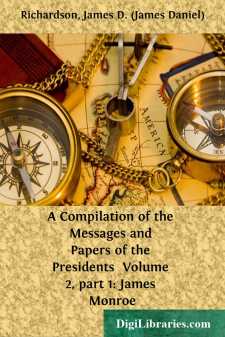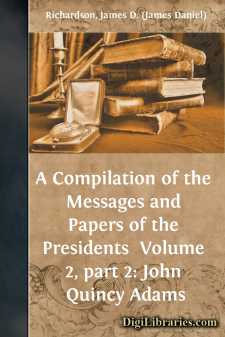Categories
- Antiques & Collectibles 13
- Architecture 36
- Art 48
- Bibles 22
- Biography & Autobiography 813
- Body, Mind & Spirit 142
- Business & Economics 28
- Children's Books 14
- Children's Fiction 11
- Computers 4
- Cooking 94
- Crafts & Hobbies 4
- Drama 346
- Education 46
- Family & Relationships 57
- Fiction 11829
- Games 19
- Gardening 17
- Health & Fitness 34
- History 1377
- House & Home 1
- Humor 147
- Juvenile Fiction 1873
- Juvenile Nonfiction 202
- Language Arts & Disciplines 88
- Law 16
- Literary Collections 686
- Literary Criticism 179
- Mathematics 13
- Medical 41
- Music 40
- Nature 179
- Non-Classifiable 1768
- Performing Arts 7
- Periodicals 1453
- Philosophy 64
- Photography 2
- Poetry 896
- Political Science 203
- Psychology 42
- Reference 154
- Religion 513
- Science 126
- Self-Help 84
- Social Science 81
- Sports & Recreation 34
- Study Aids 3
- Technology & Engineering 59
- Transportation 23
- Travel 463
- True Crime 29
A Compilation of the Messages and Papers of the Presidents Volume 4, part 3: James Knox Polk
Categories:
Description:
Excerpt
James K. Polk
JAMES KNOX POLK was born in Mecklenburg County, N.C., November 2, 1795. He was a son of Samuel Polk, a farmer, whose father, Ezekiel, and his brother, Colonel Thomas Polk, one of the signers of the Mecklenburg Declaration of Independence, were sons of Robert Polk (or Pollock), who was born in Ireland and emigrated to America. His mother was Jane, daughter of James Knox, a resident of Iredell County, N.C., and a captain in the War of the Revolution. His father removed to Tennessee in the autumn of 1806, and settled in the valley of Duck River, a tributary of the Tennessee, in a section that was erected the following year into the county of Maury; he died in 1827. James was brought up on the farm; was inclined to study, and was fond of reading. He was sent to school, and had succeeded in mastering the English branches when ill health compelled his removal. Was then placed with a merchant, but, having a strong dislike to commercial pursuits, soon returned home, and in July, 1813, was given in charge of a private tutor. In 1815 entered the sophomore class at the University of North Carolina. As a student he was correct, punctual, and industrious. At his graduation in 1818 he was officially acknowledged to be the best scholar in both the classics and mathematics, and delivered the Latin salutatory. In 1847 the university conferred upon him the degree of LL.D. In 1819 he entered the law office of Felix Grundy, then at the head of the Tennessee bar. While pursuing his legal studies he attracted the attention of Andrew Jackson, and an intimacy was thus begun between the two men. In 1820 Mr. Polk was admitted to the bar, and established himself at Columbia, the county seat of Maury County. He attained immediate success, his career at the bar only ending with his election to the governorship of Tennessee in 1839. Brought up as a Jeffersonian and early taking an interest in politics, he was frequently heard in public as an exponent of the views of his party. His style of oratory was so popular that his services soon came to be in great demand, and he was not long in earning the title of the "Napoleon of the Stump." His first public employment was that of principal clerk of the senate of the State of Tennessee. In 1823 was elected a member of that body. In January, 1824, he married Sarah, daughter of Joel Childress, a merchant of Rutherford County, Tenn. In August, 1825, he was elected to Congress from the Duck River district, and reelected at every succeeding election till 1839, when he withdrew from the contest to become a candidate for governor. With one or two exceptions, he was the youngest member of the Nineteenth Congress. He was prominently connected with every leading question, and upon all he struck what proved to be the keynote for the action of his party. His maiden speech was in defense of the proposed amendment to the Constitution giving the choice of the President and Vice-President directly to the people. It at once placed him in the front rank of Congressional debaters....












